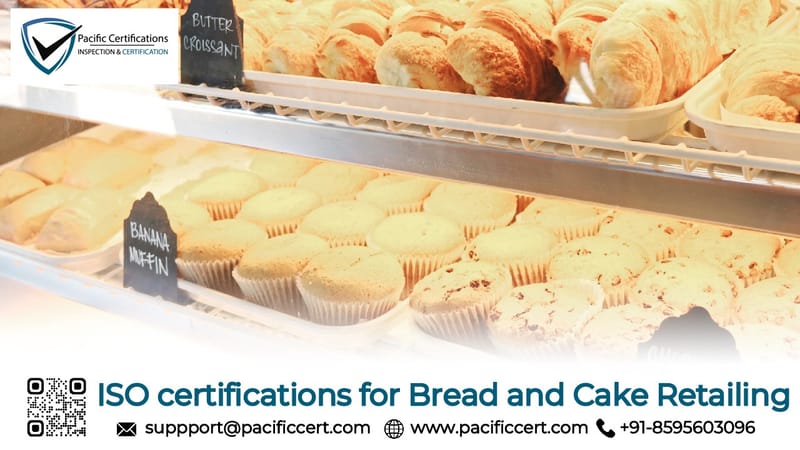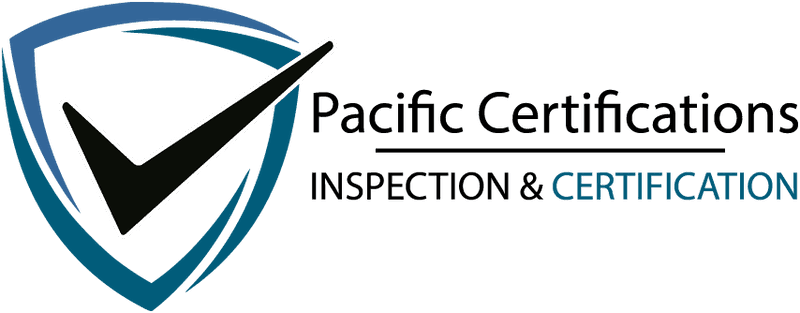ISO Certifications for Bread and Cake Retailing, Requirements and Benefits

Introduction
The bakery and confectionery retail sector has grown beyond traditional storefronts to become a global market defined by quality, hygiene, and customer experience. From neighborhood bakeries to international retail chains, ensuring food safety and consistency is critical.
According to Fortune Business Insights (2024),the global bakery products market is projected to reach USD 675 billion by 2030, growing at a CAGR of 5.7%. As consumer awareness about health, safety, and sustainability increases, ISO certifications help bread and cake retailers establish credibility, maintain hygiene, and manage their operations professionally.
For bakery retailers, these certifications, ISO 9001 & ISO 22000 are particularly important as they ensure that the products meet the highest standards of safety and quality, which are crucial in food retail.
Quality in every slice and safety in every bite — ISO certification ensures your bakery earns both trust and taste — Pacific Certifications
If your retailing business is ready to get certified, reach out to us at [email protected] or call +91-8595603096.
Applicable ISO Standards for Bread and Cake Retailing
In the food retailing industry, several ISO standards are particularly relevant. The key ISO standards include:
Standard | Description | Relevance |
|---|---|---|
ISO 22000 – Food Safety Management Systems (FSMS) | Integrates HACCP principles with management control to prevent foodborne hazards. | Ensures safe handling, preparation, and storage of bread, cakes, and pastries. |
ISO 9001 – Quality Management Systems (QMS) | Focuses on consistent process control and customer satisfaction. | Ensures uniform taste, freshness, and service quality across outlets. |
ISO 14001 – Environmental Management Systems (EMS) | Provides a framework for reducing waste and managing resources responsibly. | Promotes eco-friendly packaging, energy conservation, and sustainable sourcing. |
ISO 45001 – Occupational Health & Safety Management Systems (OHSMS) | Sets standards for safe and healthy workplace practices. | Protects bakery staff from injuries related to ovens, mixers, and food handling. |
ISO 50001 – Energy Management Systems (EnMS) | Helps monitor and optimize energy use. | Reduces energy costs in baking, refrigeration, and lighting operations. |
ISO/IEC 17025 – Testing & Calibration Laboratories | Ensures reliable food and ingredient testing results. | Guarantees consistency in flour quality, moisture levels, and baking outcomes. |
ISO 26000 – Social Responsibility | Promotes ethical sourcing, fair labor, and community engagement. | Encourages local ingredient sourcing and responsible retail practices. |
ISO 9001: Quality Management Systems
ISO 9001 is one of the most widely recognized ISO standards. ISO 9001 ensures that bakery products consistently meet customer and regulatory requirements, leading to improved quality and efficiency.
ISO 22000: Food Safety Management Systems
ISO 22000 is specifically designed for the food industry and addresses food safety management. This standard combines and complements the core elements of ISO 9001 with HACCP (Hazard Analysis and Critical Control Points) principles to ensure food safety at all stages of the supply chain.
ISO 14001: Environmental Management Systems
ISO 14001 provides a framework for businesses to manage their environmental responsibilities.
ISO 45001: Occupational Health and Safety Management Systems
ISO 45001 certification demonstrates a commitment to employee well-being, which can lead to higher employee morale and productivity.
ISO 26000: Social Responsibility
By following the principles outlined in ISO 26000, businesses can enhance their corporate social responsibility (CSR) efforts, contributing positively to society and gaining customer trust.
Click here to find out more applicable standards to your industry
What are the requirements of ISO Certifications for Bread and Cake Retailing?
Achieving ISO certification for your retailing business requires meeting specific requirements outlined in the ISO standards. Below is an overview of the key requirements:
General requirements:
- Food Safety Policy: Define safety and hygiene policies that align with ISO 22000 and local food regulations.
- Hazard Analysis & Risk Control: Identify biological, chemical, and physical hazards during baking, cooling, and storage.
- Process Documentation: Maintain standard operating procedures for dough preparation, baking, packaging, and display.
- Supplier Management: Verify ingredient quality, supplier hygiene standards, and batch traceability.
- Employee Hygiene Training: Ensure all food handlers follow proper sanitization and temperature control practices.
- Allergen & Labeling Control: Manage allergen declarations and accurate labeling of ingredients.
- Equipment Maintenance: Regularly service ovens, chillers, and mixers to maintain safety and performance.
- Internal Audits: Conduct regular audits to verify compliance with food safety and quality requirements.
- Corrective Actions: Identify non-conformities and apply preventive measures to avoid product recalls.
- Management Review: Evaluate food safety performance, customer complaints, and audit findings periodically.
- Waste & Energy Monitoring: Track energy consumption and food waste reduction initiatives.
- Regulatory Compliance: Comply with food safety acts, FSSAI (India) or FDA (US) regulations, and labeling laws.
- Customer Feedback System: Use customer feedback to improve recipes, presentation, and service quality.
Specific requirements:
ISO 9001: Quality Management Systems
- Quality Policy: Develop a quality policy that aligns with your business objectives and customer expectations.
- Process Management: Establish and document processes for all key activities, including production, packaging, and distribution.
- Customer Focus: Implement systems to understand and meet customer requirements, including feedback mechanisms.
- Continuous Improvement: Regularly review and improve your processes to enhance quality and efficiency.
ISO 22000: Food Safety Management Systems
- Hazard Analysis and Critical Control Points (HACCP): Implement HACCP principles to identify, evaluate, and control food safety hazards.
- Good Manufacturing Practices (GMP): Ensure that all production processes adhere to GMP standards to prevent contamination.
- Traceability: Establish systems to trace products throughout the supply chain, from raw materials to finished products.
- Emergency Preparedness: Develop and implement plans to manage food safety emergencies, including recall procedures.
ISO 14001: Environmental Management Systems
- Environmental Policy: Develop a policy that outlines your commitment to environmental protection and sustainability.
- Environmental Impact Assessment: Identify and assess the environmental impact of your business activities, including waste management and energy use.
- Legal Compliance: Ensure that your business complies with all relevant environmental regulations and standards.
- Resource Efficiency: Implement measures to reduce resource consumption, including water, energy, and raw materials.
Tip: Start by integrating ISO 22000 and ISO 9001 to strengthen food safety and consistency — once mature, add ISO 14001 and 45001 to build sustainability and workplace safety into daily bakery operations.
What are the benefits of ISO Certifications for Food Retailing?
Below are the key benefits of implementing ISO certifications in bakery retailing:
Food Safety: ISO 22000 minimizes contamination risks and ensures hygienic food handling.
Quality Consistency: ISO 9001 standardizes baking processes for consistent taste and freshness.
Sustainability: ISO 14001 supports eco-friendly packaging, waste reduction, and efficient resource use.
Employee Safety & Morale: ISO 45001 reduces accidents and improves workplace hygiene, increasing staff confidence.
Energy & Cost Efficiency: ISO 50001 helps manage baking and cooling energy usage effectively.
Testing Accuracy: ISO 17025 ensures reliable ingredient and product testing for quality assurance.
Compliance: Certification aligns with national food safety laws and international trade standards.
Credibility: Builds customer trust and improves reputation in local and global markets.
Efficiency: Streamlined procedures reduce rework, wastage, and downtime.
Customer Retention: Certified bakeries enjoy stronger loyalty through proven quality and transparency.
The bakery and confectionery retail segment is undergoing digital and sustainability transformation. Allied Market Research (2025) projects that by 2030, over 60% of organized bakery retailers will pursue ISO 22000 certification to meet export and franchise compliance requirements.
Growing consumer focus on ingredient transparency and eco-friendly packaging has pushed more brands toward ISO 14001 and ISO 26000 adoption. In addition, energy-efficient bakeries implementing ISO 50001 report up to 15% lower operating costs annually.
The trend is clear: ISO certification has become a powerful differentiator that elevates brand value and ensures customer confidence in an increasingly competitive bakery market.
How Pacific Certifications Can Help
Pacific Certifications is accredited by ABIS, we provide independent audit and certification services for all major ISO standards relevant to food production and retailing.
Pacific Certifications can help by:
Conducting audits for ISO 22000, 9001, 14001, 45001, and 50001.
Issuing globally recognized ISO certificates for bakeries, confectioneries, and food retailers.
Supporting integrated management system certification for multi-branch or franchise-based businesses.
If you need support with ISO certification for your Bread and Cake Retailing business, please contact us at [email protected] or +91-8595603096
FAQs: ISO Certifications for Bread and Cake Retailing
What is ISO certification, and why is it important for bread and cake retailers?
ISO certification is a mark of quality, safety, and sustainability that is recognized worldwide. For bread and cake retailers, it ensures that products meet international standards, leading to improved customer trust and business reputation.
Which ISO standards are most relevant to bread and cake retailing?
The most relevant ISO standards for food retailing include ISO 9001 (Quality Management) and ISO 22000 (Food Safety).
How can Pacific Certifications help with ISO Certifications?
We specialize in auditing and certifying businesses to ensure compliance with ISO standards. We conduct thorough audits and issue globally recognized ISO certifications.
What are the benefits of ISO certification for my business?
ISO certification offers numerous benefits, including improved product quality, enhanced operational efficiency, increased customer trust and compliance with regulatory requirements.
How long does the ISO certification process take?
The process typically takes several months, including the initial audit, non-conformity resolution, and certification decision.
Is ISO certification mandatory for bread and cake retailers?
ISO certification is not mandatory but highly recommended. It demonstrates a commitment to quality and safety, which can enhance your business's reputation and attract more customers.
How often do I need to renew my ISO certification?
ISO certification is typically valid for three years. To maintain your certification, you will need to undergo regular surveillance audits.
Can Pacific Certifications help with training or implementation of ISO standards?
No, we do not provide training, implementation, or consultancy services. Our role is strictly limited to auditing and certification.
What should I do if my business fails the initial ISO audit?
We will provide you with a detailed report outlining the areas of non-conformity. You will need to address these issues before a re-audit can be conducted and certification granted.
How can I get started with the ISO certification process?
To get started, contact us at [email protected] or +91-8595603096. We will guide you through the process!
Read More at: Blogs by Pacific Certifications
Author: Ashish

